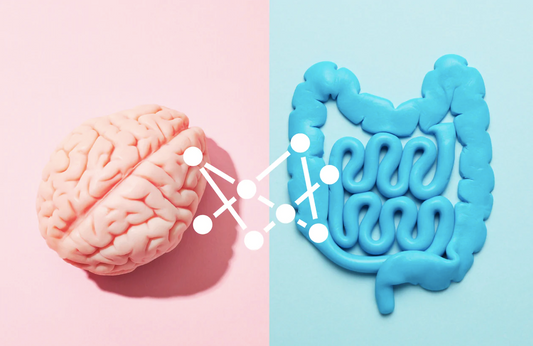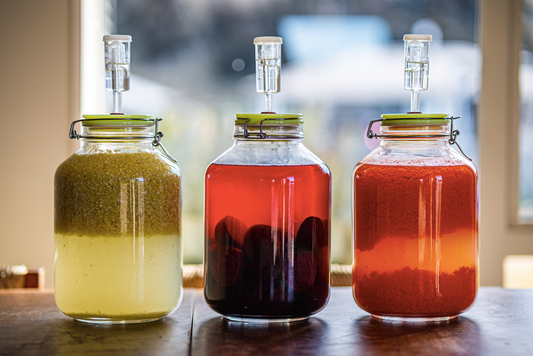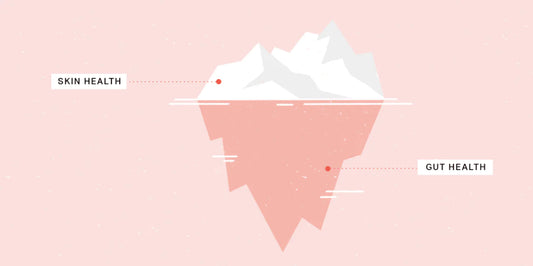For many people, daily habits follow a familiar rhythm: coffee to wake up, wine or beer to wind down. While that ritual feels comforting, alcohol can have a bigger impact on your gut than most people realise.
We know that whatever goes into your mouth will have some sort of impact on your microbiome - starting with your oral microbiome and then impacting different areas of your gut all the way down your digestive tract.
From altering your microbiome to weakening your gut lining, here’s how alcohol affects digestive health — and what you can do to protect yourself.
1. Alcohol and the Gut Microbiome
Your gut microbiome is made up of trillions of bacteria and other microbes that influence digestion, metabolism and even mood. Alcohol disrupts this delicate balance in several ways:
- Acts like a disinfectant: Alcohol has antimicrobial properties, meaning it can reduce the diversity of beneficial bacteria — similar to using hand sanitiser in your gut.
- Encourages dysbiosis: Many alcoholic drinks (wine, cider, cocktails, beer) are high in sugar, which fuels less-desirable bacteria and yeasts, leading to overgrowth and crowding out beneficial strains.
- Increases endotoxins: Alcohol encourages growth of bacteria that release lipopolysaccharides (LPS) - inflammatory compounds that can leak into the bloodstream and trigger immune responses and inflammation. You might experience headaches, joint pain or a skin flare up as a response to this.
2. Alcohol and the Gut Lining
Your intestinal lining acts as a barrier, deciding what gets absorbed into your bloodstream and what stays out. Alcohol weakens this barrier in several ways:
- Creates “leaky gut”: Regular alcohol intake increases intestinal permeability by breaking down the connections (tight junctions) between our gut lining cells making it easier for toxins and bacteria to pass into circulation.
- Slows repair: Alcohol interferes with the body’s ability to repair the gut lining, making small amounts of damage more likely to accumulate.
3. Alcohol and Histamine
Alcohol is a known histamine liberator and also inhibits the DAO (diamine oxidase) enzyme within our gut which is needed to break histamine down. This double-hit means histamine can build up more easily, leading to acute symptoms such as flushing, headaches, nasal congestion, itching and gut upset or long-term intake and higher levels of histamine can contribute to mood related symptoms, pain/inflammation and headaches/migraines which are all mediated by histamine.
4. Alcohol and Digestion
Beyond the microbiome and gut lining, alcohol interferes with digestion more directly:
- Reduces nutrient absorption: Alcohol impairs absorption of key vitamins and minerals, especially B vitamins, magnesium, and zinc. Longer term and more chronic intake reduces nutrient absorption the most.
- Alters motility: Depending on the type and amount, alcohol can either speed up (low alcohol concentrations) or slow down gut transit time (higher alcohol concentrations) - contributing to diarrhoea, constipation and reflux.
How to Support & Repair Your Gut if You have been Overdoing it
The good news is your gut has remarkable resilience. Our microbiome can change day by day according to what we put in and our lifestyle factors. Our gut cells turnover every 3-5 days - given the right environment we can see quick changes in gut health! If you’ve been drinking frequently, here are some steps that can help restore balance:
- Rebuild the microbiome: Have half a plate worth of fibre-rich foods (vegetables, legumes, whole grains) at every meal and a quarter plate of fermented foods like sauerkraut, Clover Ferments, kimchi and unsweetened yoghurt. These encourage the growth and diversity of beneficial bacteria.
- Support the gut lining: Nutrients like L-glutamine, zinc carnosine and omega-3 fatty acids can help repair intestinal permeability.
- Reduce inflammation: A diet rich in polyphenols (dark berries, green tea, extra-virgin olive oil, cacao) has anti-inflammatory and microbiome-supportive effects. While we can add things in we can also take things out that contribute to inflammation: alcohol, sugar, ultra processed foods in general (baked goods, fried foods, packaged foods etc)
- Hydration: Adequate water plus electrolytes to ensure proper hydration! It’s really important that the mucosal lining of your gut is hydrated. Drink 2L minimum per day and add a pinch of sea salt to your water for important electrolytes OR use a 100% electrolyte supplement (without the sweeteners and flavours).
- Cycle in alcohol-free days: Giving your gut and liver regular breaks helps the microbiome reset and lowers long-term risks.
6. How Much Alcohol Is Safe?
Research shows that no amount is completely risk-free for health. We also know that more traditionally fermented varieties were lower in alcohol and free of many of the additional ingredients that are used today and therefore more beneficial to your gut.
My general recommendation is to save alcohol for the weekends and special occasions and then limit intake to 2 serves. I would also encourage you to avoid beverages that combine alcohol with sugary liquids like tonic, sprite, artificial sweeteners etc.
Key Takeaway
Your gut is central to your overall health, influencing immunity, hormones, mood and metabolism. Alcohol may feel like a way to “take the edge off” but it often leaves a hidden trail of inflammation, nutrient depletion and microbiome disruption.
Use it wisely and your gut will thank you!
Grace Mortimer

Grace Mortimer - Head Clinical Nutritionist
Pheno Nutrition
https://www.phenonutrition.com/
-
BSc Neuroscience
-
dipGrad Human Nutrition
-
HPN2 Clinical Nutrition
References:
- https://pubmed.ncbi.nlm.nih.gov/26695747/
- https://www.pnas.org/doi/10.1073/pnas.1415174111
- https://jneuroinflammation.biomedcentral.com/articles/10.1186/s12974-018-1328-9?utm_source=chatgpt.com
- https://pubmed.ncbi.nlm.nih.gov/10344773/
- https://pmc.ncbi.nlm.nih.gov/articles/PMC7463562/?utm_source=chatgpt.com
- https://www.deficitdao.org/en/dao-deficiency/histamine/food-which-interferes-in-histamine-metabolism/dao-blocking-foods/?utm_source=chatgpt.com
- https://pubmed.ncbi.nlm.nih.gov/37049411/
- https://pubmed.ncbi.nlm.nih.gov/27527893/




